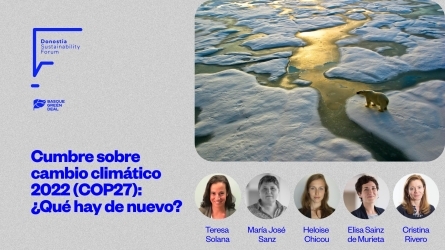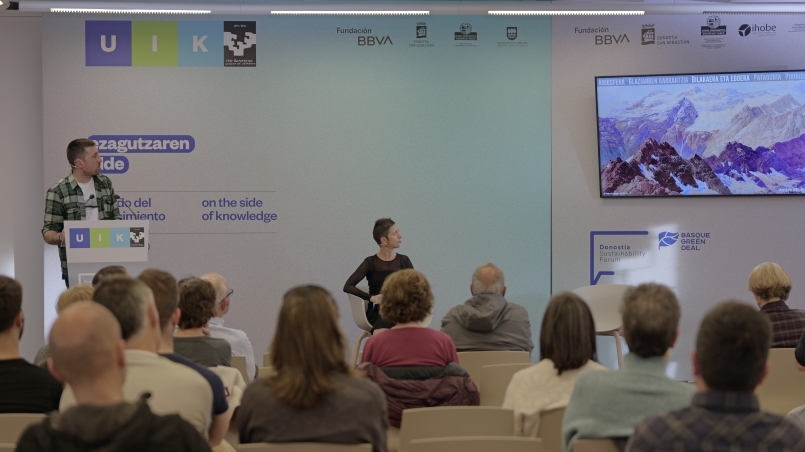María José Sanz: "My assessment of COP28 is that the glass is half full"
The scientific director of the Basque Centre for Climate Change (BC3) explained that the text approved there is equally good and bad for everyone.
In December 2023, the United Nations Conference on Climate Change, COP28, was held in Dubai. The Donostia Sustainability Forum addressed the analysis of the outcome of this summit, inviting María José Sanz, the scientific director of the Basque Centre for Climate Change (BC3).
María José Sanz holds a PhD in atmospheric pollution and its effects on plants. In addition to being an expert in climate change science, she also works with the political and social aspects of the problem.
'My assessment of COP28 is that the glass is half full,' she said reflectively. 'Transitions have begun,' says Sanz, 'but we need to step on the accelerator more.
Sanz began her presentation by explaining what a Conference of the Parties (COPs) are and what has been key, both for their success and failure. She visited their history since their inception in the 1992 Earth Summit in Rio de Janeiro, where three Rio conventions were adopted, which addressed climate change, biodiversity, and desertification. She also mentioned the Kyoto Protocol and the failure of Copenhagen in 2009, where an agreement was attempted, which finally materialized in 2015 in Paris.
The agreements adopted in these conferences ‘have legal implications', emphasized Sanz. 'But they must be translated into European legislation first or, in the case of each country that ratifies it, into their laws.'
The context of COP28 was marked by the wars in Ukraine and Gaza, the consequent energy crisis, and the climate crisis. Sanz explains that the energy crisis can evolve in two ways: 'Either we do nothing because we are trying to preserve energy security with the energy sources we have, or we push for the transition to renewable energies.'
'Furthermore, in the previous COP, a discussion about loss and damage began,' Sanz recalls. 'There are developing countries that already have significant damages, and these countries demanded payment because they were not the ones causing these damages.' Two years ago, this issue began to move forward, resulting in the creation of a technical network at COP25 in Madrid and the approval of a fund at COP27 in Sharm el-Sheikh. On the first day, the presidency itself allocated 100 million dollars. 'This had never happened before,' says Sanz. These decisions 'are always made at the end.' Countries follow suit, and within two days, the fund reaches 700 million. This is the most positive aspect of the COP.
The adaptation convention
According to Sanz, this convention could be called the COP of adaptation. 'Adaptation is placed on the same level as mitigation, as the impacts of climate change are already here.' After adopting the decision on the Global Goal on Adaptation, a two-year deadline was given to define the indicators for measuring adaptation.
Regarding mitigation, an important issue is the carbon market, which was a flexibility mechanism proposed in Kyoto. 'It is established as an end in itself from my point of view, which is not necessarily good,' Sanz opines. 'These are the elements of the negotiations in which no progress was made.'
And, of course, a sensitive issue is the future of fossil fuels. What to do with fossil fuels is the elephant in the room.' Sanz explains that some progress was made at COP28. 'It is not the wording we would expect in terms of phasing out, but it [including the concept of transitioning away] is a small step.'
Another important issue has been how climate objectives will be financed. There is a debate that started last year and will continue until next year about a new global objective for climate finance.
'And in this maelstrom of paradigms, we have the first global stocktake, the first collective effort to determine if we are making progress or not and how to move forward,' explains Sanz. 'The presidency is positioned at a much more neutral level than initially thought a country like this could have in a COP. There was a lot of mistrust.'
However, it should be noted that next year's convention will also be held in an oil-producing country. It will be in Baku, Azerbaijan.


